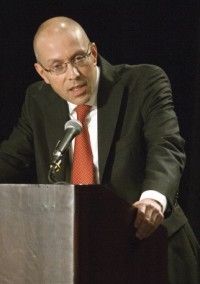Williamsburg audience narrowly votes against a more “United States of Europe.” On stage are Jörg Asmussen, Liam Fox and moderator Roger Cohen.
By Bill Sullivan
A collegial debate marked the final public session in this week’s Williamsburg-CSIS forum on the future of the European Union. New York Times columnist Roger Cohen moderated the exchange, which considered the motion, “A United States of Europe?”
Jörg Asmussen, a Social Democrat currently serving as Germany’s deputy labor minister, took the affirmative position, but declared that it was “too early” to talk about a United States of Europe that would bear any resemblance to the United States of America. Seeing unification as a long-term project, he credited the EU for improving peace and prosperity in the region, and favored continuing on a path of economic, political and social integration.
Liam Fox, a former British secretary of defense and current Conservative Party member in the British House of Commons, took the contrary position, arguing that the EU is an “intrusive union” that involves itself too much in foreign policy and social policy.
The combatants were credible stand-ins for their respective nations, with Germany the clear leader in the drive for European integration and the United Kingdom seeking to maintain more national autonomy. The UK, for example, refused to adopt the euro, preferring to retain full control over its national currency, the pound.
Read more about this week’s forum.
Distinct perspectives on globalization emerged. Asmussen quoted from the Preamble of the EU’s Charter of Fundamental Rights, which states that “the Union is founded on the indivisible, universal values of human dignity, freedom, equality and solidarity.” He argued that “Europe can only preserve its interests if it acts as one.” In an era of global commerce, he said, politicians can’t pretend to be able to solve transnational issues with national policies. “Either we integrate further, or we will dis-integrate,” said Asmussen.
Liam Fox
Fox declared a willingness to “cooperate with like-minded” neighbors, but expressed concern that the European Union’s rigid bureaucracies would strip national autonomy and the very identities of its citizens. “Let us never be forced together,” said Fox, but “rejoice in our diversity.”
For much of the debate Asmussen found himself parrying a barrage of criticisms of the union’s perceived failures. Fox challenged Asmussen’s claim that the EU had brought peace and prosperity, arguing that NATO was the more credible security pact and that the adoption of the euro was an “act of historic folly” that likely deepened the recent financial crisis by preventing individual nations from using their own monetary policy as “shock absorbers.”
Fox was also sharply critical of the weight of business regulations on the European economies. “Why should we be forced to harmonize our business and labor costs?” he asked, declaring that the inevitable result would be to make the EU’s member countries “equally uncompetitive.”
Asmussen held firm on the efficiencies of collaboration. “Unions can provide public goods that countries wouldn’t be able to provide on their own.” He disputed the claim that EU policies or the Eurozone were to blame for the economic crisis, and he defended Germany’s advocacy of integration. Leadership meant “one should identify a goal, then the steps required to get there, then go out and fight for it.”
A long silence followed moderator Roger Cohen’s question about whether Europeans “need a July 4th” to strengthen their sense of union. Asmussen said that he believes “there is an emerging sense of European identity” and pointed to May 9, Europe Day, commemorating the 1950 Schuman Declaration, which offered a framework for cooperation.
Liam Fox questioned whether there was a real need for the political promotion of European identity. He said he has no problem being Scottish and British at the same time, but “if someone told me I had to be European first and British second, I’d tell them to get lost.”
The session concluded with the audience voting on the motion, “A United States of Europe?” with a show of hands. No formal count was made, but Cohen declared Fox’s “nay” side victorious by a slim margin.
Participants in the Williamsburg-CSIS Forum held one additional closed session Wednesday morning before returning to Washington, D.C. to conclude the conference.


Leave a Reply